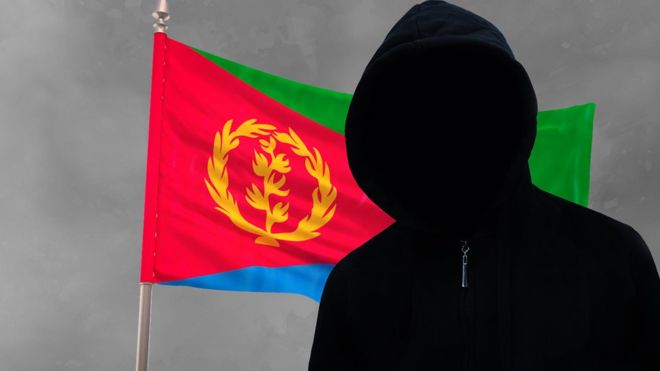Eritrean Press: Reporting on Africa's most secretive state

He's the editor of a popular Facebook page that provides news from a country with one of the world's worst records on press freedom. But not even the journalists who write for him know his real identity.
On the surface, J's life appears fairly ordinary.
He has a day job, a family and a football team he follows religiously.
But J is also the anonymous editor of the largest page on Facebook reporting news from his home country, Eritrea.
According to Reporters Without Borders, only North Korea has less press freedom.
The international media monitoring organisation describes Eritrea as "a dictatorship in which the media have no rights".
All news outlets inside the north-eastern African country are state-owned, and journalists have been imprisoned without trial or charge.
That makes J's page, Eritrean Press, unusual - and perhaps unique. It has more than 250,000 followers, and is independent of the Eritrean government. J lives in Britain, but makes occasional trips back to Eritrea, and he agreed to give his first interview to the BBC on condition we keep his identity a secret.
Not even the page's eight volunteer writers - based in Eritrea, Britain and the US - know his real name.
"No-one knows who I am," he says. "I'd be in prison."
The content on the Facebook page covers the broad sweep of Eritrean life. Alongside politics and satire, there are reports about the national cycling team, human interest stories and posts original art deco architecture in the capital Asmara.
It's a mix that on average reaches about 1.25 million people each week. Its address is the slightly misspelled @EritreanPresss, because the page with the correct spelling is an overtly pro-government fake, with a tenth of the followers. It's unclear who runs that page.
Most readers of the genuine Eritrean Press are part of the Eritrean diaspora around the world.
The content on the Facebook page covers the broad sweep of Eritrean life. Alongside politics and satire, there are reports about the national cycling team, human interest stories and posts original art deco architecture in the capital Asmara.
It's a mix that on average reaches about 1.25 million people each week. Its address is the slightly misspelled @EritreanPresss, because the page with the correct spelling is an overtly pro-government fake, with a tenth of the followers. It's unclear who runs that page.
Most readers of the genuine Eritrean Press are part of the Eritrean diaspora around the world.
Although Eritrea has a population of more than five million people, J estimates only around 30,000 of his readers are inside the country itself.
It's not because of censorship. Unlike in North Korea, China or Iran, social media is mostly unregulated. Instead, the problem is access to the internet, which is both unreliable and expensive. Barely more than 1% of the Eritrean population has access to the web, according to the World Bank.
